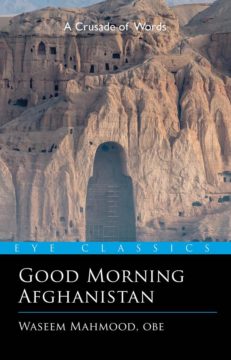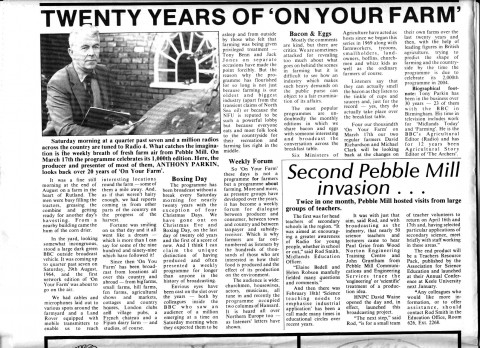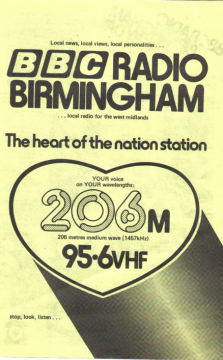
Countryfile team. Copyright resides with the original holder, no reproduction without permission
Regarding Countryfile, it is fun to look at the photograph and recognise old friends/colleagues.
My involvement was to be a producer on Farming, with Martin Small, and Exec John Kenyon. We wanted to acknowledge the large “over the shoulder” audience we had on Farming, and hence wrote the brief for Countryfile. I remember it well, sitting in John Kenyon’s office sketching in the idea, and kicking around names. I came up with the Countryfile name, although we may have thought it should be two words…
Michael Grade, Controller BBC1 accepted the idea, the team went from 4 to 24, and the Countryfile bandwagon started rolling.
After poor Brain Strachan died, there was a vacancy on Top Gear, and John Kenyon told me to get some broader experience, before applying to run Countryfile. So I did, but they did not want me to run Countryfile, as I was supposedly too biased to the farming community and Mike Fitzgerald got the gig.
I stuck with Top Gear and the rest is history…
Ken Pollock
The following comments were left on the Pebble Mill Facebook page:
Patrick Flavelle: ‘I started on a rolling weekly contract working with Fitz surfacing potential stories at the fag end of Farming…led to working on the show for its first 11 years. Happy days and incredibly boozy Xmas do’s…the one after this photo was very messy!’
Mick Murphy: ‘3rd from right, 2nd row – Sue Lloyd, Director. 1st on the left, front row – Barry Paine, former BBC producer / wildlife narrator, who used to voice over some of our films. Girl behind Fitz is called Sarah…? Great picture. ‘
Jane McLean: ‘John Clarke on the left .. who I went to Russia and Siberia with for Countryfile in 1989. Should try & find the Russian pix. Talk about an eye opener. The director was Dick Colthurst (what happened to him?) and the crew was Nigel Davey, Barrie Foster, Keith Rodgerson and Andy Frizzell. We were force-fed vodka shots 24/7 – honestly! ‘
Pam Relton: ‘Dick is very successful Jane – he went to BBC Bristol after CountryFile and is now MD at Tigress Productions.’
Jane McLean: ‘Good on him. Never heard of Tigress Prods – am SO out of the loop these days re anything telly!’
Viv Ellis: ‘I recognise Yasmine O’Grady looking glam – as ever. I worked on Farming for a few months’
Roy Thompson: ‘Spent a very happy attachment to Countryfile from Wood Norton even getting to direct a piece on arts in rural communities. Very supportive and friendly team.’
Andrea Buffery: ‘This picture would look amazing next to the Countryfile team today. It consists of 30 plus people.’
Steve Johnson: ‘I worked on Countryside for a short time in mid nineties, arranged the filming of the brand new RSPB reserve at Conwy.’
Pam Relton: ‘As a real City girl, CountryFile opened my eyes to so many things. I remember my first shoot – in a battery hen farm, a barn the size of a hanger filled with chickens in cages no bigger than themselves, floor to ceiling, the noise!! I’ve not knowingly eaten anything other than free range, outdoor-reared produce since. I learned so much about the pressures on farmers and producers to comply with the big supermarkets. This was the great thing about working on programmes like this – that open up the issues to do with farming and the countryside to everyone.’
Jane McLean: ‘I was country born & bred Pam – my brother was a pig farmer – and I know exactly what you’re talking about from the other side! ‘
 Waseem Mahmood worked at Pebble Mill for 8 years in the 1980s first on the Asian Programmes Unit and then on Farming. Life took him on a very different path after he left the BBC. Specialising in the reconstruction of media in post war countries, he found himself working in Bosnia, Kosovo, Afghanistan and Iraq to name but a few. Afghanistan was to be a turning point. When a dodgy kebab prevented him from being on the aircraft that crashed into the Pentagon on 9-11, it was to set in motion a series of events that sound like they come straight out of the pages of a thriller. It is a time of chaos… Afghanistan has just witnessed the fall of the Taliban. Warlords battle each other for supremacy, while the powerless, the dispossessed, the hungry and the desperate struggle to survive. In this time of bleakness, suffering and want, a glimmer of hope emerges in the form of a spirited little radio station.
Waseem Mahmood worked at Pebble Mill for 8 years in the 1980s first on the Asian Programmes Unit and then on Farming. Life took him on a very different path after he left the BBC. Specialising in the reconstruction of media in post war countries, he found himself working in Bosnia, Kosovo, Afghanistan and Iraq to name but a few. Afghanistan was to be a turning point. When a dodgy kebab prevented him from being on the aircraft that crashed into the Pentagon on 9-11, it was to set in motion a series of events that sound like they come straight out of the pages of a thriller. It is a time of chaos… Afghanistan has just witnessed the fall of the Taliban. Warlords battle each other for supremacy, while the powerless, the dispossessed, the hungry and the desperate struggle to survive. In this time of bleakness, suffering and want, a glimmer of hope emerges in the form of a spirited little radio station.



